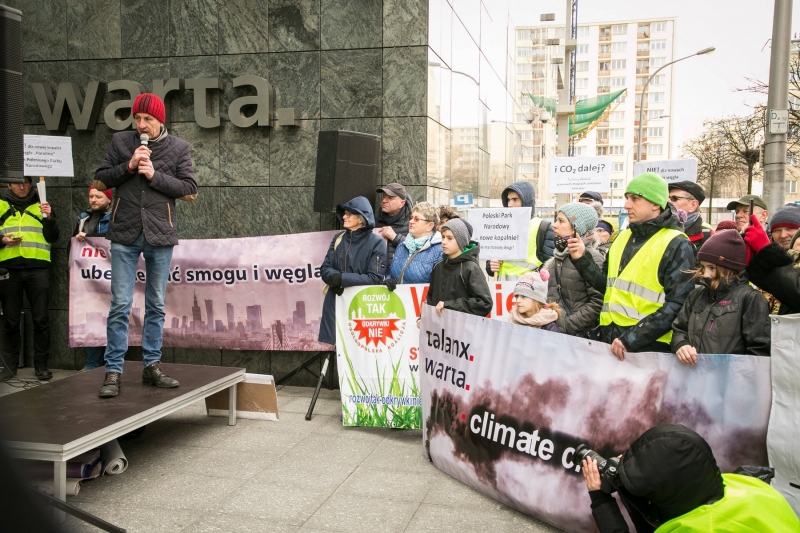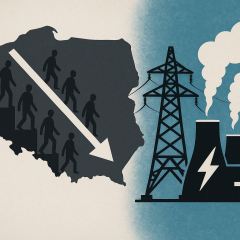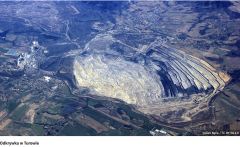It was the sixth attempt to obtain a pledge from TUiR Warta to follow the footsteps of the world's largest insurers and commit to stop underwriting coal-fired power plants and lignite and hard coal mines planned in Poland and anywhere in the world.
"The years-long protests of Polish local communities against the construction of new lignite and hard coal mines gain new significance due to the rapidly changing coal insurance market" - comments Kuba Gogolewski, a senior finance campaigner from the "Development YES - Open-Pit Mines NO" Foundation ("DY-OPMN"). Last week, Vienna Insurance Group (VIG) - the eighth company in the world and the fifth engaged in coal insurance in Poland in the past, announced its new policy, excluding underwriting of new coal power plants and mines. ZE PAK - an undiversified lignite miner and generator needs to renew its insurance contract covering all mines and equipment and most power plants as well as environmental risks associated with the company's lignite interests by the end of March. VIG’s decision means higher costs for ZE PAK and less options. Other entities of the Polish coal sector are also struggling to acquire or renew insurance contracts.
"The "DY-OPMN" Foundation together with Unfriend Coal and local communities, directly experiencing the consequences of lignite and hard coal mining , have already addressed the German insurer Talanx and its subsidiaries TUiR Warta and HDI Polska by letters with requests for meeting and reference to arguments" - reminds Gogolewski.
"Poland is known as one of the biggest and most progressive countries in the European Union, and at the same time still plans to extract and burn the dirtiest and most CO2 intensive fuel - lignite”, diagnoses Stanisław Skibiński, president of the Association "No to Złoczew open-pit mine". “It clearly contradicts EU’s climate policy and commitments of the Paris Agreement and the COP24 in Katowice. Poland is committed to reducing emissions and wants to open new mines. Energy transformation is inevitable, and the Polish government, postponing it will not only deepen the energy collapse, but also through a significant increase in energy prices will reduce the competitiveness of our economy."
Renata Walczak, a resident of the commune threatened with the open-pit mine Dęby Szlacheckie adds: "By living near lignite open-pit mines, we are condemned to bear the costs of their operations. Drought is one such cost. It is particularly difficult for the farming commune of Babiak, as the insurance is a big problem with the effects of drought. It is impossible or so expensive that farmers cannot afford it. At the same time, insurance companies such as Warta or HDI insuring lignite mines cause the droughts to become even more problematic. The association of the mine and the insurance company results in the creation of a machine in which farmers, entrepreneurs and ordinary residents become victims. It must be said out loud - insurance companies supporting lignite mining act to the detriment of every resident living near the open-pit mines."
Krzysztof Gorczyca, the president of the Lublin Society for Nature and Human, so argues the opposition of his organization to the hard coal mine in his region: "In Polesie Lubelskie, the construction of 3-6 new coal mines is planned. It is one of the most valuable natural parts of Poland and Europe. A large part of the area covered by the mining plans is protected as a National Park, a Ramsar convention facility, Nature 2000 sites, nature reserves and landscape parks. UNESCO has included this area in the "Western Polesie" International Biosphere Reserve. The natural wealth of Polesie is lakes and peat bogs depending on delicate water conditions, and coal mining is a violent interference in hydrology. Mine hollows pose a threat to local agriculture. The interest of a rapidly growing group of residents connected with tourism is also at risk. Over tens of thousands of inhabitants of the region relax every year over the Polesie lakes. After completion of the possible extraction, there will no longer be a return to the "pre-mine" state - the current character of the lake district will be lost definitively."
“It`s time for Warta to stop insuring such socially harmful and impractical investments as the Ostrołęka C power plant, which are already struggling with new economic problems", says Radosław Ślusarczyk, president of the association Workshop for All Beings. "Displacements, destruction of the local economy, air pollution, health damage and fossil fuel-driven climate change are the reasons for local communities from different regions of Poland to protest in front of the seats of two decision-making centres: the Ministry of Energy on one side, and on the other - Warta Tower in Warsaw – the exclusive seat of one of the last insurers in Poland that have not yet withdrawn from underwriting coal utilities.”








